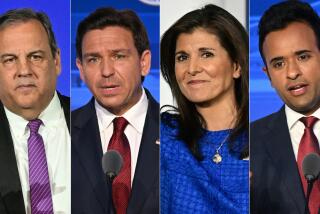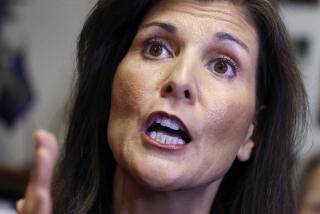Five Potential GOP Rivals Slam Clinton : Politics: Seeking early Southern Republican support, prospective candidates in ’96 denounce President’s foreign, domestic policies.
- Share via
ATLANTA — Bidding for early Southern support in the 1996 campaign, five Republican presidential prospects denounced President Clinton this weekend for being too timid to assert U.S. influence abroad and too eager to extend the reach of the federal government at home.
The potential candidates aimed their Clinton critiques at a conclave of about 600 party officials and grass-roots GOP workers from the 13 states of the Old Confederacy that make up the most solid part of the Republican presidential base.
“They are the political machinery in the region,” said Alec Poitvint, chairman of the biannual Southern Republican Leadership Conference, which concludes here today. “For someone thinking of running for President, this is a great place to be.”
The most severe criticism of Clinton’s handling of foreign affairs came from the nation’s senior Republican elected official, Senate Minority Leader Bob Dole of Kansas, who ranked first in a recent USA Today poll of voter preferences for the party’s 1996 nomination.
“I worry about lack of world leadership demonstrated by the White House,” Dole told the crowd at a reception Friday night. “Our credibility is being eroded around the world.” He complained that Clinton, in dealing with the bloody civil war in Bosnia and crises in Haiti and Korea, had not been decisive enough in his actions.
Referring to opinion surveys that indicate most Americans are reluctant to get involved overseas, Dole said: “You can’t run America by polls. You can’t take a poll every day on Bosnia and Korea. You have to stand up to the American people and persuade the American people, and then they’ll follow you.”
Dole told reporters before his speech that he plans to push this week for Senate approval of a resolution directing the President to lift the arms embargo against the Muslim-led Bosnian government, regardless of what U.S. allies want to do.
Dole also charged that the Clinton Administration had “gone too far” in cutting defense spending, leaving the United States ill-prepared to deal with crises overseas. “There is a difference between cutting and gutting,” said Dole, who called for a two-year moratorium on military-base closings.
Similar criticism came from two-term South Carolina Gov. Carroll A. Campbell Jr., who has been testing the presidential waters even as he campaigns for Republican congressional and gubernatorial candidates in the 1994 elections.
“I travel this world a lot,” Campbell said in a speech to the conference’s opening session Friday, “and world leaders everywhere say: ‘What is wrong with your country? Why don’t you lead?’ ”
“I have to say that I don’t know,” he said. “We can’t turn inward and do nothing.”
Campbell, a former House member, argued that the United States should have taken a stronger role in urging quicker U.N. intervention in Bosnia.
“We made a lot of threats to do things and didn’t do them until it was too late,” he said. “We’d better understand that we have here (in Bosnia) a Muslim group, and we’d better ask ourselves this question: ‘Are we not doing what we should do there because they are Muslims?’ ”
While some Republicans contend that Clinton’s difficulties abroad offer GOP candidates a chance to reap political hay, others disagree.
“When you are running a campaign, you find that people are more interested in what you can do for them directly about such things as jobs, taxes and welfare reform,” said Larry Bigham, who is challenging incumbent Democratic Rep. John M. Spratt Jr. in South Carolina’s 5th District.
Bigham and others who share his view were no doubt pleased with Saturday’s conference address by former Housing and Urban Development Secretary Jack Kemp, who barely mentioned foreign affairs and instead critiqued Clinton’s proposals for domestic reforms.
Citing the collapse of Communist regimes abroad, Kemp said: “While the whole world is moving toward privatization, you go to Washington and hear President Clinton talk about nationalizing the country.”
He also challenged his own party, saying: “We can’t just be the party of small government and big prisons. We have to propose what we want to do to lift up this country and bring us together.”
Kemp called on Republicans to make a greater effort to reach out to African Americans and other minorities by becoming “the party of democratic capitalism for the inner cities of America.”
Former Tennessee Gov. Lamar Alexander, who has been quietly but steadily building a 1996 campaign infrastructure through a satellite and cable television network called Republican Neighborhood Meetings, also complained that Clinton is unnecessarily expanding the federal government.
“We should spend less time reinventing government and more time remembering how we got to be such a great country in the first place,” said Alexander, who served as education secretary under President George Bush.
Alexander faulted Clinton’s “Washington-knows-best” proposals for education reform for not allowing more flexibility and freedom of choice for individual parents and their children.
Instead of adopting Clinton’s elaborate and costly ideas for welfare reform, he said, the nation would be better off “sending welfare back to the states along with the dollars to pay for it.”
Texas Sen. Phil Gramm, the final presidential aspirant to speak, concentrated his fire on Clinton’s proposal to reform health care, which he labeled as “socialized medicine.”
In addition to imposing an excessive taxing burden and driving many small business into bankruptcy, Gramm said the proposal would take away the right to choose a doctor from most Americans, except for employees of the federal government and some big corporations.
“But let me give you the good news,” he said, “there is a big difference between Elvis and the President’s health care plan. And the big difference is that Elvis may be out there alive somewhere.”
More to Read
Get the L.A. Times Politics newsletter
Deeply reported insights into legislation, politics and policy from Sacramento, Washington and beyond. In your inbox twice per week.
You may occasionally receive promotional content from the Los Angeles Times.










